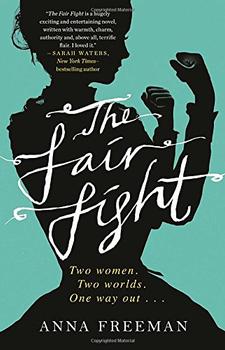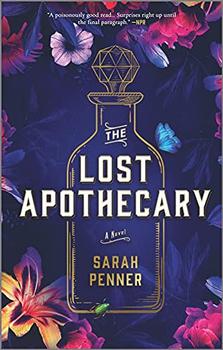Summary | Excerpt | Reading Guide | Discuss | Reviews | Beyond the book | Read-Alikes | Genres & Themes | Author Bio

Anna Freeman's debut novel, The Fair Fight, highlights the world of boxing in England during the late 18th century. The book is narrated in the first person by three individuals: Ruth, a young woman who has grown up in a house of prostitution and is tapped as a fighter by one of her mother's clients; George, a middle-class gentleman with high-class friends, all of whom like to gamble; and Charlotte, a well-off woman who becomes acquainted with both George and Ruth through her brother, George's close companion. The plot follows these three as Ruth and then later her husband Tom engage in high-stakes bouts and as the others become increasingly invested – financially and emotionally – in their success or failure.
Centering the drama on the London pugilistic scene is an inspired choice; the boxing ring was one of the few areas in urban England where the upper and lower classes mixed freely, and choosing it as the book's axis allows the author to fully explore both worlds. The book is character-driven however, with the creations so incredibly well developed, that I have a hard time believing The Fair Fight is a debut. Each individual has a unique voice and viewpoint, and even minor actors are fully fleshed out and convincing. This is an especially difficult feat to accomplish when a writer is trying to forge a friendship between two women from vastly different social classes, since this type of relationship was unthinkable during the time period. Freeman's skill is amply displayed, however, as both are drawn with such depth that one has no trouble believing in their camaraderie. The action sequences, most of which take place during boxing matches, are exquisitely rendered – they're very detailed and exciting – but not the book's heart and soul; these scenes are more of a means to further develop the characters than a way to advance the plot.
Ruth in particular uses a lot of vernacular and boxing jargon. Initially I found her voice difficult to read, but it didn't take me long to adjust to her patois. For example, in one section she relays a "for show" bout she was hired to fight:
We began our dance. I threw a few fast pokes, though not much to hurt. When Tom and I played at fighting in the [brothel's] yard, to please the misses or the cullies, he'd move his head when I fibbed him, so as to make the force seem more than it was. This cull did nothing of the sort, but rather looked at me with a scornful eye. This riled me a little, and I threw my fist in earnest. There, he felt that. He shook his head like a bullock and I threw two more, fast as a shuttle. These I pulled back so as not to really hurt, but put enough into them to make them sting. He wasn't scornful now. My hand stung something cruel; the cloth inside the mufflers had ripped the scabs from the cut that Tom had given me the day before.
Ruth narrates the first 50 pages, after which she doesn't reappear as a narrator for some time, so readers who find these sections challenging may want to persevere beyond that point to get the full flavor of the novel.
The Fair Fight is an old-fashioned, well-written historical fiction novel that leaves you feeling good. Readers who enjoy historical fiction in general and England during this time period will find much to love here. The subject matter is unusual and entertaining and the richly drawn characters make this one a winner.
![]() This review was originally published in The BookBrowse Review in May 2015, and has been updated for the
April 2016 edition.
Click here to go to this issue.
This review was originally published in The BookBrowse Review in May 2015, and has been updated for the
April 2016 edition.
Click here to go to this issue.

If you liked The Fair Fight, try these:

by Rita Bullwinkel
Published 2025
An electrifying debut novel from an "unusually gifted writer" (Lorrie Moore) about the radical intimacy of physical competition

by Sarah Penner
Published 2022
A forgotten history. A secret network of women. A legacy of poison and revenge. Welcome to The Lost Apothecary.
Your guide toexceptional books
BookBrowse seeks out and recommends the best in contemporary fiction and nonfiction—books that not only engage and entertain but also deepen our understanding of ourselves and the world around us.